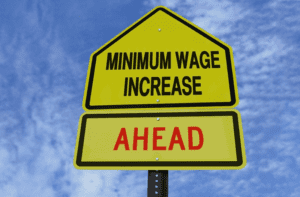The move to make flipping burgers and shoehorning fries into a lucrative career has been a national debate pitting hourly workers against the businesses that employ them. Granted, doubling the entry-level wage seems ideal for those struggling to survive. However, as more states and municipalities force the issue through legislation or ballot initiatives, the downside risk becomes increasingly, and painfully, obvious.
 It’s a bite that the Big Apple is experiencing firsthand as the minimum wage increased 15% on Jan. 1, and employees who rely on tip wages to eke out a living are salving their dashed hopes of gaining ground because restaurant owners are slashing hours and, in many cases, abolishing hospitality positions altogether.
It’s a bite that the Big Apple is experiencing firsthand as the minimum wage increased 15% on Jan. 1, and employees who rely on tip wages to eke out a living are salving their dashed hopes of gaining ground because restaurant owners are slashing hours and, in many cases, abolishing hospitality positions altogether.
Well, that didn’t take long at all.
They Mean Well
The idea of using a baseline wage to overcome poverty is a noble, longstanding U.S. tradition, and it needs to die a quick death.
An increase in the minimum wage increases unemployment; there is no success when raising the mandated minimum price of labor above the productivity of lesser skilled workers. A recent report by the New York City Hospitality Alliance warns about the loss of wages and jobs. It interviewed 574 establishments — 324 full-service restaurants and 250 limited-service restaurants — and published the following results:
“76.50% of full service restaurant respondents reduced employee hours, and 36.30% eliminated jobs in 2018, in response to mandated wage increases. 75% of limited service restaurant respondents report that they will reduce employee hours, and 53.10% will eliminate jobs in 2019 as a result of mandated wage increases that took effect on December 31, 2018.”
A swing and a miss.
Meet Joe Bloostein, owner-operator of six New York City restaurants, who employs 50 to 110 service workers in each location and who is now on the defensive to keep the doors open. As Bloostein admits, “We lost control of our largest controllable expense. So in order to live with that and stay in business, we’re cutting hours.”
And he also raised menu prices and eliminated staff positions. “[It] will cost more to dine out, it’s not great for labor, it’s not great for the people who invest in or own restaurants, and it’s not great for the public.”
Now patrons are greeted by a sign instead of a hostess, who is out looking for another job.
The Same Old Pandering
In 1987, believe it or not, The New York Times ran a scandalous headline, The Right Minimum Wage: $0.00, and opined:
“Raising the minimum wage by a substantial amount would price working poor people out of the job market. A far better way to help them would be to subsidize their wages or — better yet — help them acquire the skills needed to earn more on their own.”
Skilled labor isn’t a concept the present Democrats in Congress understand, either. In their pandering to appease the increasing vocal socialist demographic, they recently introduced legislation to raise the federal minimum wage to $15 an hour, a desperate political ploy to reinvent themselves as the party of the workingman. The Raise the Wage Act would hike the minimum wage to $15 per hour by 2024 through annual increases.
Another fly in the ointment to salve the wounded poor is that the value of a national baseline wage depends on where the employees live. Amazon has been widely lauded for its $15-an-hour minimum wage. But where will employees feel that extra dollar or two? Pew Research did the math for us:
“A $15 hourly wage yields $17.10 worth of purchasing power for a worker at Amazon’s Spartanburg, South Carolina, warehouse, for example, but only $13.57 for a worker at the warehouse in Kent, Washington, a Seattle suburb about 20 miles south of the company’s headquarters.”
It sounds positive until you understand what Amazon eliminated in order to accommodate the lower level salaries: stock options. An employee after two years of service would receive one share of the e-tailer’s stock, valued today at $1,671.31, and one share each year after. But Amazon traded that option for the instant gratification of a few extra dollars, even less after taxes, in each paycheck.
 To What End?
To What End?
In 2019, 22 states and the District of Columbia are incrementally increasing their baseline earnings. Yet economists have claimed over the years that the minimum wage only harms those it is intended to help. So why is there the constant low-frequency drumbeat to continue the practice? The answer is simple: politicians.
Famed economist Ludwig von Mises said it best when he mused about the matter in his 1962 masterpiece, The Ultimate Foundation of Economic Science: “No politician is any longer interested in the question whether a measure is fit to produce the ends aimed at. What alone counts for him is whether the majority of the voters favor or reject it.”



